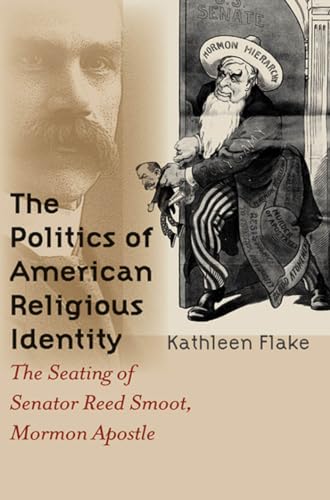The Politics of American Religious Identity
The Seating of Senator Reed Smoot, Mormon Apostle
Kathleen Flake
BOOK REVIEW

In a gripping analysis that reverberates through the very heart of American history and identity, The Politics of American Religious Identity: The Seating of Senator Reed Smoot, Mormon Apostle by Kathleen Flake peels back the layers of societal perception surrounding one of the most contentious figures in early 20th-century politics. This insightful examination invites you to confront the uncomfortable intersections of religion, politics, and identity, catapulting you into the turbulent waters of a period when American society was grappling with its very soul.
Flake's exploration of Senator Reed Smoot, a prominent apostle of the Church of Jesus Christ of Latter-day Saints, reveals much more than the biography of a single man. It sheds light on the broader implications of religious belonging in a nation that often relegated non-Protestant identities to the fringes. From the moment Smoot stepped into the Senate chamber in 1903, he became a lightning rod for controversy, igniting a fierce public debate about what it meant to be American amid the backdrop of increasing immigration and religious diversity. Flake compels you to confront this pivotal moment, daring you to question your own understanding of American identity.
As you wade through Flake's richly woven narrative, you can almost feel the pulse of a society on the verge of transformation. Her meticulous research introduces you to the political theater of Smoot's confirmation hearings, which became a microcosm of the larger national struggle to define what America should look like. Senate debates flowed like blood in the water, raising fraught questions about loyalty, faith, and the character of a nation still grappling with its ideals of freedom and inclusion. Each page ignites a sense of urgency that you can't ignore. You will find yourself questioning what it means to belong to a society that is both welcoming and hostile-a theme that resonates profoundly today.
Critics laud Flake's ability to balance historical rigor with compelling narrative, offering biting insights that challenge traditional narratives. The discord between Protestant establishment and the rising tide of Mormonism serves as a stark reminder of the precariousness of American identity, one defined not simply by laws and government but by societal constructs of religion and belonging. Readers are hooked by Flake's detailing of public sentiment during the Smoot hearings-outraged letters from everyday Americans, scathing political cartoons, and impassioned speeches fuel the narrative, making history feel visceral and immediate.
But not all opinions are in Flake's favor. Some critics argue that her focus on Smoot's experience skews broader discussions of evangelicalism and the political landscape of the time, raising questions about whether her narrative pigeonholes Mormon identity into a singular experience. Are we opening ourselves to richer understandings of plurality, or are we still wrestling with monolithic views? Yet, these critiques only deepen the discourse surrounding the book, adding layers to the already rich tapestry of American religious and political identity.
As you delve into The Politics of American Religious Identity, be prepared for a rollercoaster of emotional engagement. Flake's examination forces you to grapple with uncomfortable truths-how easily identity can become a weapon, and how politics can fracture even the most intimate aspects of belonging. It is not merely an academic exercise; it's a clarion call to understand the ongoing implications of religious identity in contemporary society.
This work transcends the historical scope to demand action in our present. Are we still navigating the rocky seas of identity politics? Have we learned anything from the Smoot saga that can guide us through today's sociopolitical landscape? Flake's narrative resonates with urgency, leaving you with a haunting sense of responsibility: to not only recognize our past but to shape a future reflective of genuine inclusivity.
As you close this transformative book, you may find that the questions it raises linger long after the last page is turned. Kathleen Flake's The Politics of American Religious Identity is not just a historical narrative; it's a challenge-a challenge to confront our prejudices, embrace our complexity, and ultimately, to redefine what it means to be American in an ever-evolving world. 🌍
Dive into this narrative, and confront the unyielding truths that shape not only our historical landscape but also the very essence of our contemporary identity. Your understanding of America-and perhaps even of yourself-may never be the same. Remember, the past isn't just a collection of dusty tales; it's a living, breathing entity shaping our present. Don't let this transformative discussion pass you by!
📖 The Politics of American Religious Identity: The Seating of Senator Reed Smoot, Mormon Apostle
✍ by Kathleen Flake
🧾 256 pages
2004
#politics #american #religious #identity #seating #senator #reed #smoot #mormon #apostle #kathleen #flake #KathleenFlake